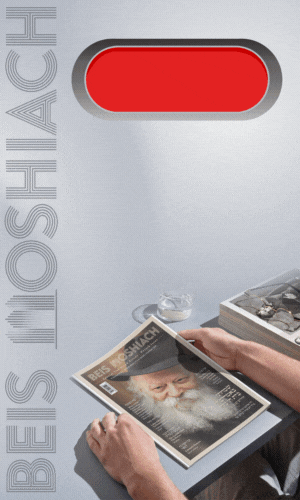Since You Started, Don’t Stop
Op-ed by Levi Liberow • Yiddishkeit is not a religion of ideas alone. Rather to create of this world a dira b’tachtonim This transition from ideas to events and people can be seen in what is the pinnacle of Yiddishkeit – Moshiach. The concept of Moshiach begins as a sublime idea, but the Jewish concept of Moshiach clearly focuses on an era of Moshiach that is ushered in and led by a Moshiach-person • Full Article
By Levi Liberow
A famous proverb has it that “Ordinary people discuss people, wise people discuss events, and extraordinary people discuss ideas.”
This observation is very clever, but this way of framing human discourse may sometimes prove to be a sort of cop-out from dealing with the here and now which our Divine task is to imbue with Divine ideas.
Yiddishkeit is not a religion of ideas alone. The whole objective of Yiddishkeit is to create of this world a dira b’tachtonim — to bring sublime ideas into a world whose default state of being is sometimes below ordinary.
This transition from ideas to events and people can be seen in what is the pinnacle of Yiddishkeit – Moshiach. The concept of Moshiach begins as a sublime idea, but the Jewish concept of Moshiach clearly focuses on an era of Moshiach that is ushered in and led by a Moshiach-person.
We, Chabad Chassidim in the Dor Hashvi’i were given the task to make this process come full circle, from concept to fulfillment, and like everything good – this mission isn’t void of hardships and challenges.
***
Bridging the gap from lofty ideas to grounded reality is challenging but essential. Let’s analyze this process as it played out in the emergence of Chassidus:
This very dilemma caused conflict among the disciples of the Baal Shem Tov over disseminating Chassidus to the masses.
The Alter Rebbe prioritized accessibility over elitism, using physical analogies to make Divine concepts understandable to ordinary Jews. Yet some colleagues opposed this approach, wishing to avoid the “defilement” of simplification.
The classic story tells of the Baal Shem Tov asking Moshiach when he would come. Moshiach replied: “When your wellsprings spread outward.” This motivated the Alter Rebbe’s derech of Chabad Chassidus.
However, an oral tradition (which, incidentally, is not brought in Chabad sources…) adds an important detail – upon hearing Moshiach’s words, a tear rolled down the Baal Shem Tov’s cheek. This tear represented the pain of making lofty crown jewels accessible to a flawed world. The Alter Rebbe’s colleagues therefore avoided such public outreach, refusing to cause such anguish.
What was the opinion of the Baal Shem Tov and the Maggid on this very dilemma?
It seems that the Baal Shem Tov and the Maggid themselves seem to perhaps have been undecided on this question until a later point in time.
When imprisoned, the Alter Rebbe asked his predecessors why he was being prosecuted for openly sharing Chassidic teachings. They replied that intense heavenly judgment came against him for exactly this reason.
The Alter Rebbe then asked – if freed, should he cease his public teaching? Their reply: “Since you already started, do not stop. Increase them!”
The intensity of this exchange is sometimes overlooked. It begs a host of questions. Who caused the kitrug? (Not the misnagdim it seems…) Why was the Baal Shem Tov and Maggid’s answer of “You should not stop” conditioned by the fact of “since you already started”? Is this perhaps an indication that if the Alter Rebbe would have consulted with them prior to developing his derech they would have advised him to not begin and only after the fact did they endorse what he was doing?
What is unknown is unknown, but there certainly is a message for us here.
***
As we said, the concept of Moshiach too can be divided into three parts: the idea, the event, and the person.
Moshiach as an idea was long ago introduced to the world. That is Chassidus, Toraso shel Moshiach. Moshiach as an ideal, as a concept that lies in the upper world of Atzilus and will one day materialize in the world is easy to “sell” and to present. It’s easy to sell, because it’s easy to identify with. We feel comfortable with it. We truly believe in it, as it provides context to all of creation and is a really “neat” way to package and explain Yiddishkeit. As an accomplished speaker and teacher said once, “Moshiach is not a hard concept to explain; I have a much harder time explaining kaparos to secularly-educated people…”
Moshiach as an event requires more faith. We must step out of the comfort of the idea-world and declare that this idea has begun to take form in this world of action. In the world of action there is more that we stand to lose. And still, events are processes that can take years and decades to unfold, and as such, the prospects of taking that leap of faith to declare unabashedly that higia zman haGeulah is not that hard. We’re not the only ones doing it, and we have what to point to as support for our commentary of world events.
Moshiach as a person is where it gets especially tough. We all believe that Moshiach is a person and we all know who it is. We all know that “the Nasi shebador is the Moshiach shebador.” Anyone would be hard-pressed to find a Lubavitcher Chassid that thinks otherwise. And yet, many of us all the time, and all of us some of the time, find this message of the Rebbe (which in the last few months we heard the Rebbe speak was a central theme presented in unequivocal terms) to be hard to transmit. There’s a certain discomfort about it, and blaming it on the “chutza,” on people who lack background on this matter finding it difficult to comprehend, is a convenient excuse. But it’s only that – an excuse. A Shliach by his very definition is meant to communicate matters that people are unfamiliar with. So why is this message different?
The concerns are many and legitimate, but they must be addressed, not ignored. We must get together to devise ways to do this well and successfully. “It’s too hard” is not a Lubavitcher thing to say.
***
An additional point that should be made on this topic ties in to the aforementioned story of the Alter Rebbe.
Many aspects of the debate on if and how to go about it no longer relevant. It’s one thing if we haven’t begun it. Then it’s a legitimate question whether to start or not. But we’re no longer there. The Moshiach-as-a-person train left the station long ago and avoiding the topic is deceitful. It’s allowing people to have the impression that there is a group in Chabad that believes in it and a group that doesn’t (or at least doesn’t think it’s an important matter. Which is worse?) Is that what we want people to think? That we gave up on the Rebbe’s besuras haGeula chas v’shalom?
Yes, we must reassess how to do this best. Yes, we must acknowledge that mistakes in presenting this crucial topic have been made. But this must remain front and center in the agenda of Lubavitch.
“Since you started, don’t stop.”
“To the contrary, do more.”
185
Join ChabadInfo's News Roundup and alerts for the HOTTEST Chabad news and updates!











































